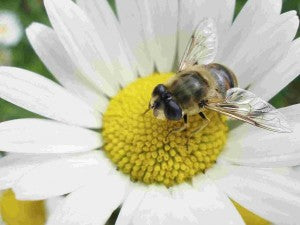We must protect our pollinators, says wildlife expert Kizzie Henderson of the Hampshire & Isle of Wight Wildlife Trust
WITH all the flowers that populate our fields and gardens, it is easy to take them for granted.

One third of the food we eat comes from crops which have been pollinated so these species are vital for our food industry. It is estimated that the value of these insects pollinating our crops and plants amounts to £100 billion.
Many of these valued pollinators have started to decline from multiple pressures, such as intensive farming methods, development and climate change. It is estimated that in England and Wales more than 97 per cent of the flower-rich grasslands that are so important for pollinating insects have been lost over the last 50 to 60 years. Such losses have had a huge impact on our pollinators which are no longer able to find the food and shelter they need.
In order to reverse this worrying decline, the government has now taken action by announcing a ten-year National Pollination Strategy to revive pollinator populations.
It aims to deliver across five areas to ensure that everything that relates to pollinators is covered.
These areas are: Supporting pollinators on farmland Seventy-one per cent of the UK land area is farmed and consequently the way farmland is managed is very important for maintaining pollinator populations. The strategy sets out plans to work with farmers to support pollinators through farming and voluntary initiatives to provide food, shelter and nesting sites. It will also concentrate on reducing the risks and damage that pesticides have on pollinators. Alison Cross, head of conservation at Hampshire and Isle of Wight Wildlife Trust, said: "It is only through working together that we can be confident about a better future for farmland wildlife including pollinating insects."
Supporting pollinators across towns, cities and the countryside The strategy will work with large scale landowners to promote simple changes to land management, ensuring that good practice is in place to help pollinators.
Several large organisations such as Network Rail, Highways Agency and the National Trust, which manage more than 800,000 hectares of land in England, have signed up to the strategy and pledged to take action such as planting more wild flowers and allowing grass to grow longer. The public will be encouraged to take action in their outdoor spaces to make them pollinator friendly.
They can access tips on how to do this at www.beesneeds.org.uk. Hosted by the Wildlife Trust and launched in July, Bees Needs gives helpful tips on how to manage gardens to attract pollinators.
It includes case studies, information sheets and tips on managing your land to help pollinators survive and thrive.
Enhancing the response to pest and disease risks Pest and disease risks to honey bees will be addressed, while improving beekeepers' husbandry and management practices to strengthen the resilience of bee colonies. Monitoring will be carried out to track evidence of pest and disease risks associated with commercially produced pollinators used for high-value crop production.
For the full Daily Echo article click here.
